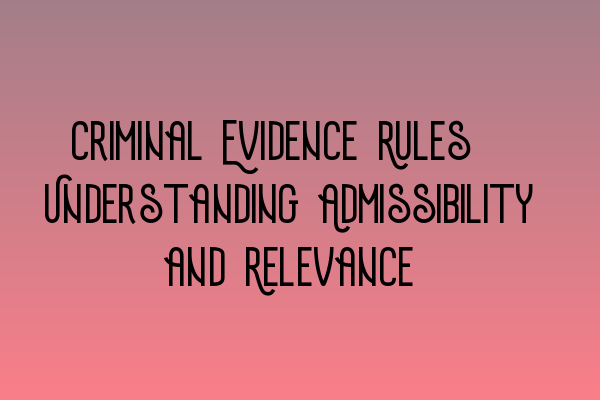Criminal Evidence Rules: Understanding Admissibility and Relevance
When it comes to criminal trials, the admissibility and relevance of evidence play a crucial role in determining the outcome. As a solicitor, it is essential to have a thorough understanding of the laws governing the admission and exclusion of evidence. In this article, we will delve into the intricacies of criminal evidence rules and shed light on key concepts that every legal professional should be familiar with.
What is Admissible Evidence?
Admissible evidence refers to any information or material that a court may consider during a trial to help establish the truth or facts of the case. Not all evidence is automatically deemed admissible. There are specific rules and criteria that govern the admissibility of evidence, ensuring fairness and reliability in the trial process.
One fundamental principle of admissible evidence is relevance. The evidence presented must have a direct bearing on the issues being litigated. The court will evaluate whether the evidence tends to prove or disprove a fact that is of consequence to the case. For example, in a murder trial, evidence such as the murder weapon or witness testimonies regarding the defendant’s presence at the crime scene would be considered highly relevant. On the other hand, evidence that has no connection to the crime or the parties involved would likely be deemed irrelevant and therefore inadmissible.
Admissibility also hinges on the reliability and credibility of the evidence. Courts typically assess the methodology used to obtain the evidence, the chain of custody, and any potential biases or motives that may affect its accuracy. Evidence that is tainted or obtained through illegal means may be excluded from the trial.
Exclusionary Rules
The criminal justice system recognizes certain exclusions that apply to evidence, even if it meets the relevance and reliability criteria. These exclusionary rules serve to protect the defendant’s constitutional rights and prevent unfair prejudice or confusion in the courtroom.
One well-known exclusionary rule is the “fruit of the poisonous tree” doctrine. This doctrine holds that evidence obtained as a result of an illegal search or seizure is considered tainted and therefore inadmissible. For example, if the police conducted a search without a warrant and discovered incriminating evidence, any subsequent evidence derived from that initial search would be considered “fruit of the poisonous tree” and excluded from trial.
Another exclusionary rule is the rule against hearsay evidence. Hearsay refers to an out-of-court statement offered to prove the truth of the matter asserted. Generally, hearsay is not admissible as evidence because it lacks the requisite guarantees of trustworthiness and cross-examination, which ensures the accuracy of the testimony. However, there are exceptions to the hearsay rule, such as statements made under certain circumstances, statements made against interest, or statements made by a party opponent.
Strategies for Utilizing Admissible Evidence
As a solicitor, understanding the admissibility of evidence is crucial for building a strong case. Here are some strategies to consider:
- Thoroughly review the evidence: Evaluate the relevance and reliability of each piece of evidence before presenting it in court. The more substantial and credible the evidence, the stronger your case will be.
- Challenge the admissibility of opposing evidence: If you believe that the opposing party’s evidence does not meet the criteria for admissibility, challenge it. Present arguments and legal precedent to support your position.
- Utilize expert testimonies: Expert witnesses can provide specialized knowledge and opinions that can bolster the admissibility and relevance of certain evidence. Be sure to incorporate expert testimonies strategically to strengthen your case.
In conclusion, understanding the rules governing the admissibility and relevance of evidence is essential for any aspiring solicitor in the criminal law field. By comprehending these rules and strategically utilizing admissible evidence, you can build a compelling case that stands up to scrutiny in the courtroom and increases your chances of a successful outcome for your clients.
For more information on legal representation and challenges in the UK and US, check out our related articles:
- Legal Representation for Delaware LLCs in the UK: Expert Advice
- Legal Challenges for UK Businesses in the U.S.: Strategies for Overcoming Hurdles
For aspiring solicitors preparing for the SQE exam, be sure to check out our article on SQE Exam Prep: Essential Study Materials for Aspiring Solicitors.
To learn more about the Solicitors Qualifying Examination format, read our comprehensive guide on Demystifying the Solicitors Qualifying Examination Format.
